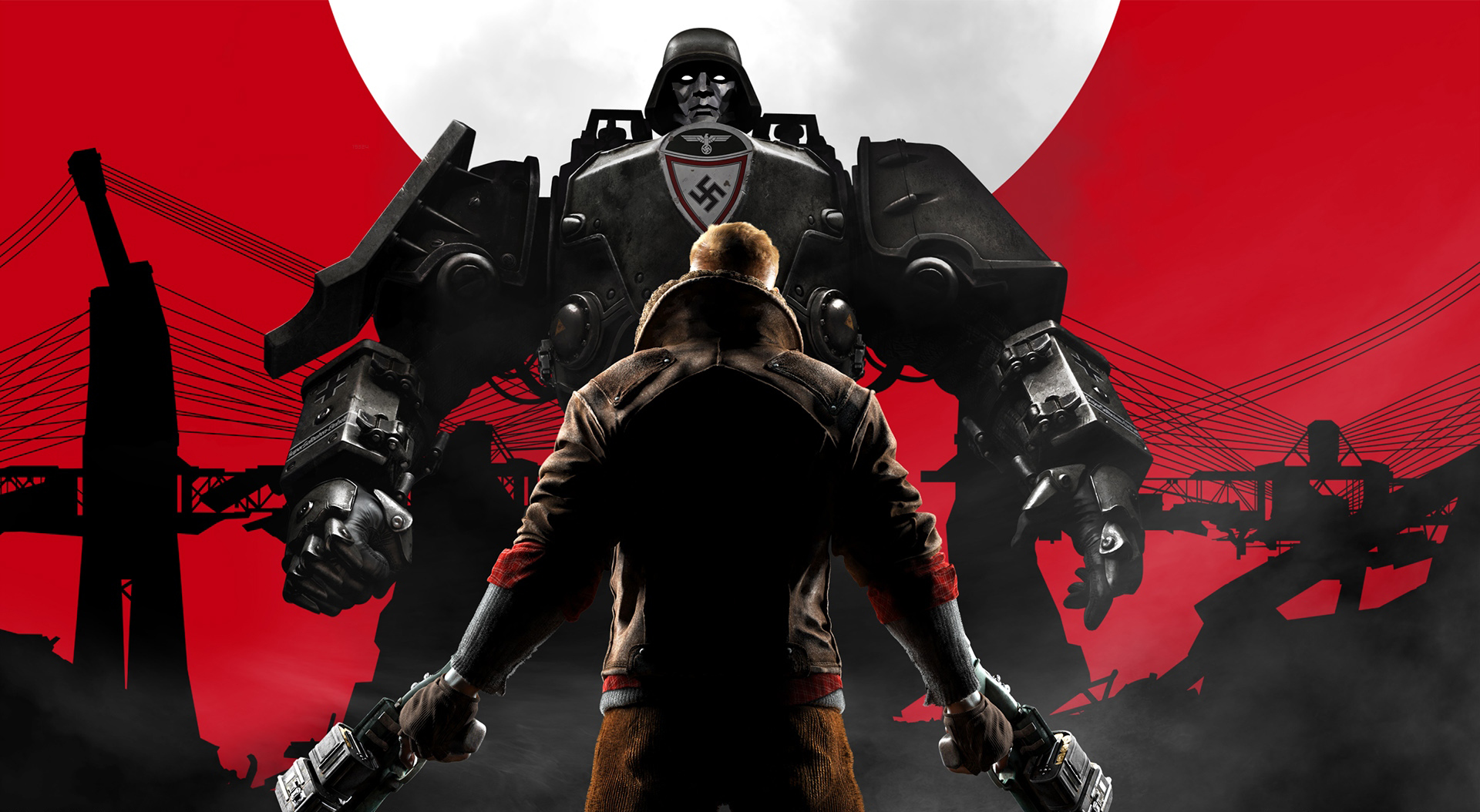Our Verdict
You can blow a Nazi to pieces among some lovingly-designed sixties furnishings and probably should.
PC Gamer's got your back
Price: £50/$60
Release date: Out now
Publisher: Bethesda
Developer: MachineGames
Multiplayer: Nope
Link: Official Site
Wolfenstein: The New Order has been made with love. This might not be obvious to you when you are giving a Nazi both barrels as the world around you collapses in a shower of bone and blood and concrete. It might not seem like the most pertinent observation to make as you hammer the middle mouse button to stab a cyberdog to death. I would forgive you for missing all this evident care and attention to detail when you wrench your first Nazi lasergun from its fixed emplacement and use it to mulch a charging column of Third Reich roboguys.
But it is there if you go looking for it. This alt-history vision of Nazi-dominated 1960s Europe has been constructed with extraordinary style. Every environment expresses a distinct identity through its colour pallette, architecture, and use of light. The interfaces, technology, even the typography of this speculative other-Earth feel correct and cohesive. The New Order is Tarantino's Inglorious Basterds by way of Moonbase Alpha—an x-rated episode of Captain Scarlet starring the world's most heavily militarised jacket potato.
B. J. Blazkowicz returns during a last-ditch Allied assault on a Nazi compound in 1946. This game is technically a sequel to Raven's 2009 Wolfenstein, but all you really need to know is that the Nazis have somehow figured out how to graft a gigantic staple remover onto a dog's face. Extraordinary technological advances like this one have given them the edge, and B. J. is left in a fourteen year coma when that war-ending final assault goes south. He wakes up in a world entirely controlled by the Third Reich and becomes the cornerstone of a resistance movement committed to righting historical wrongs.
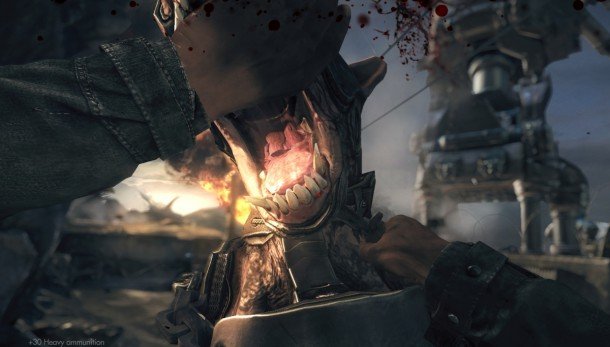
The game is a violent revenge fantasy, and history is treated like a toybox when it comes to providing you with evils to revolt against. The New Order's basic thesis is that this is okay: that concentration camps, secret police and brutal eugenics have entered into our pop cultural consciousness to the extent that they can be used as motivators for violent entertainment. Whether or not you find the game offensive will depend on how far you can truck with that sentiment. If these ideas make you uncomfortable, or if you are otherwise disturbed by body horror, scalpels or surgery, it might be best to stay away.
For all that brutality, though, this is a far more thoughtfully written and well-acted game than it has any right to be. B. J.'s folksy-poetic musings on the nature of war can be laugh-out-loud funny when juxtaposed with a Nazi trooper getting lifted off his feet by a pair of thundering megashotguns, but there's a glimmer in the game's eye when it presents you with this tonal contradiction. It's never explicitly ironic—that would get tiresome—but its characters are intelligent and larger-than-life and invested in the world around them. You'll periodically return to the resistance headquarters for some short non-combat missions, and characterful ambient conversations and well-written backmatter make this space well worth exploring. This is also a game where somebody says "I'm coming for you, you fucking Nazi spaceman", so there's that.
The best thing about The New Order as a stealth game, though, is that it's fun to fail.
There are exceptions, of course—stock situations, stock characters, heroic sacrifices that you see coming hours in advance. A physically imposing but developmentally impaired character that can only speak his own name Hodors a bit close to Hodor for his own Hodor, and the game never quite earns its more earnest attempts at gravity nor the sentimental ballad that plays over its closing credits. This is not the game that you should bring up next time you decide to have an argument about games as art, and nor does it deserve to be put on a pedestal for its presentation of history—unless that pedestal also includes a pair of thundering megashotguns and a Nazi who doesn't have arms any more. But it's better than you'd expect, and I pressed eagerly through the campaign's eight to nine hour running time and would do so again.
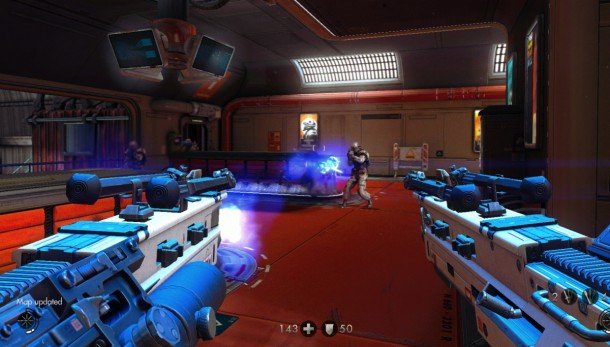
An array of collectibles and difficulty modes encourage a second run, a welcome inclusion for a singleplayer-only game. Machine Games have invested a remarkable amount of time in this optional material: the game goes so far as to include collectible recordings of 50s and 60s pop songs in their alternate universe, German language versions. Additionally, a decision you make in the prologue has an influence on the campaign that follows—you'll either be able to pick locks or hotwire certain devices depending on your choice, granting you access to special routes and different upgrade paths. In order to see everything in the game you'll need to play it twice, minimum.
It's also—and here's the important bit, really—a very good shooter. Weapons have tremendous weight, animation is top-quality across the board, and levels are divided up into arenas that are, in the main, interesting to fight across. It's also got a well-implemented set of stealth mechanics, including close-range takedowns, alternate paths, and satisfying throwing knives.
Major encounters normally include one or two commander characters that will continuously summon reinforcements to the area if they're alerted. If you play The New Order as a straight shooter, this effectively turns the game into a systemic Call of Duty: enemies will continue to arrive until you fight your way through to their commander and kill him. Unlike Call of Duty, however, a clever player can bypass the first line of soldiers, kill their commanders, and then mop up the rest without the threat of additional harassment. The best thing about The New Order as a stealth game, though, is that it's fun to fail: fumble a takedown and the game turns into an exciting shooter as you transition seamlessly from Sam Fisher to Rambo. I found myself adopting an all-or-nothing playstyle, going in quiet at first before gleefully transitioning to double shotguns with the will of a DJ finally dropping the bass.
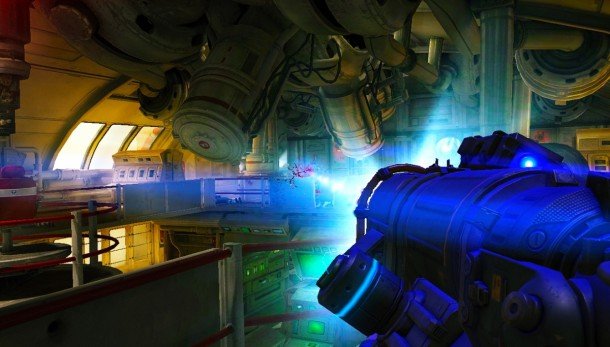
You can dual wield almost anything, and every weapon has an unlockable alternate fire mode: rockets, bouncing shrapnel, rechargeable lasers and so on. You've seen all of this before, however, and your armory leans on its visual and audio impact to compensate for a lack of originality. B. J. eventually picks up an upgradable laser cutter that can be used to carve satisfyingly freeform shapes out of certain fences and vent covers, but beyond a few unpuzzling puzzles its potential goes unexplored. The laser should be Wolfenstein's gravity gun, and you can tell that the developers want it to be, but it's really just another gun at the end of the day. Collect enough upgrades and it's a Big Fucking Gun , yes—but it's still a gun. The potential combat applications of its freeform cutting mode never materialise in a meaningful way.
The New Order is further held back by a lack of new ideas in its second half. It remains a very good shooter set in some extraordinarily detailed places, but the underlying structure of the game never escapes familiar patterns. Corridors and atriums are the rule, no matter where you are. As the game picks up pace, it loses a bit of the weight and impact that carries it at the beginning. I've also got a gripe with its damage indicators—it's often quite difficult to tell when you're being attacked from the sides or behind, and as enemy numbers ramp up this can lead to some unfair-feeling failures at higher difficulties. The AI's love of flanking maneuvers is laudable, but a bit of warning would be nice.
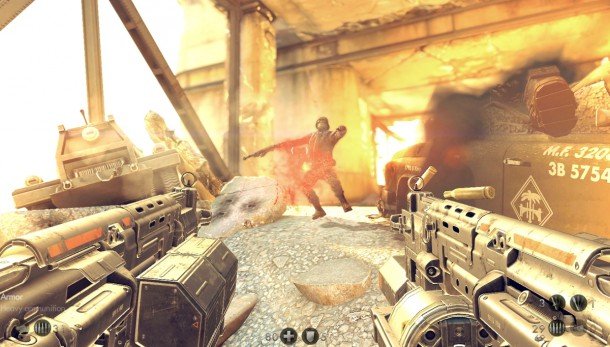
At the time of writing the game has driver compatibility issues that impact performance regardless of your rig. A bit of Googling should turn up a solution—either upgrading or downgrading your drivers, normally—but it's a hindrance, as is the abundance of texture pop-in that occurs just after you load a fresh game. The id Tech 5 engine hasn't lost its propensity to forget to render the world behind you, a bad habit that it has had since 2011's Rage.
That said, this is still the most fun I've had with a singleplayer shooter since Bulletstorm, and the most substantially well-realised setting for a shooter campaign since Metro 2033. Its writing, music and environmental art all achieve far more than you might expect from the game about a preternaturally durable testicle with a revenge fetish and a gun in each hand. In a genre that is often overtaken by derivative or exploitative games, it's a pleasant surprise—a reminder of a time when a shooter's singleplayer campaign was the main event. A time when these games were made with attention to detail, care, and a bit of love.
You can blow a Nazi to pieces among some lovingly-designed sixties furnishings and probably should.
Joining in 2011, Chris made his start with PC Gamer turning beautiful trees into magazines, first as a writer and later as deputy editor. Once PCG's reluctant MMO champion , his discovery of Dota 2 in 2012 led him to much darker, stranger places. In 2015, Chris became the editor of PC Gamer Pro, overseeing our online coverage of competitive gaming and esports. He left in 2017, and can be now found making games and recording the Crate & Crowbar podcast.
